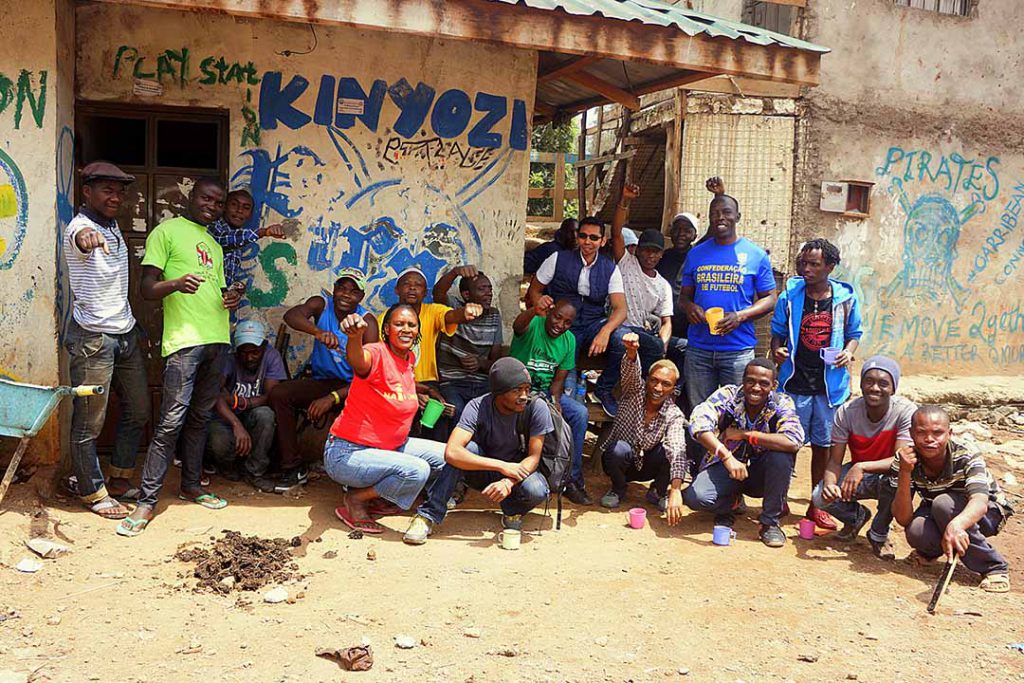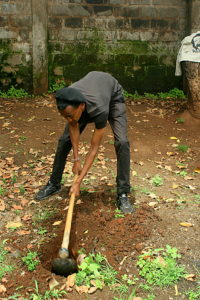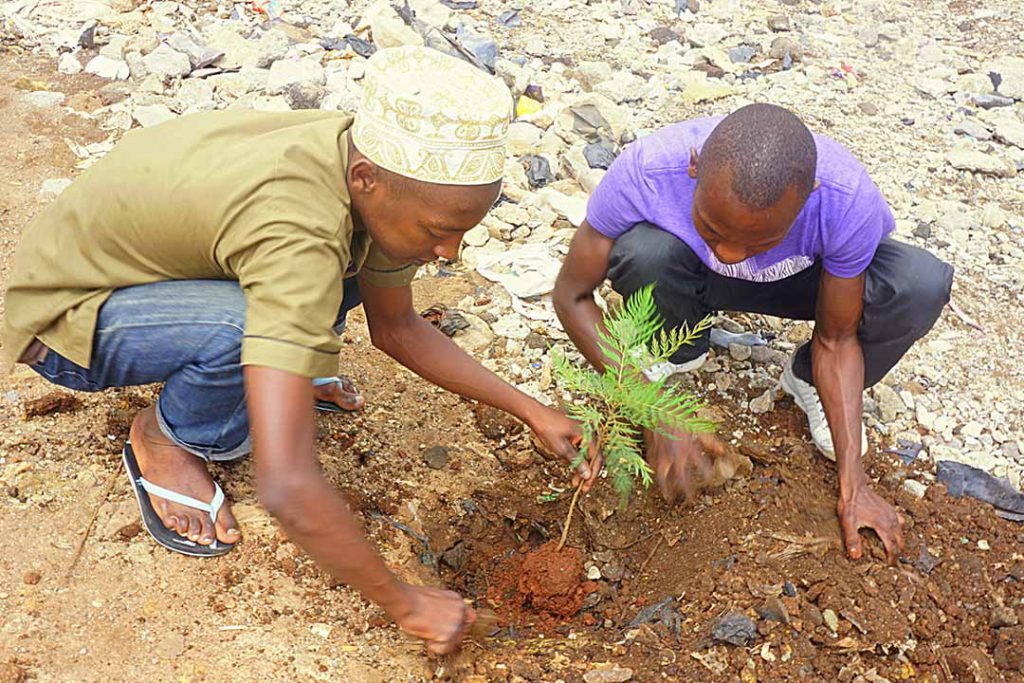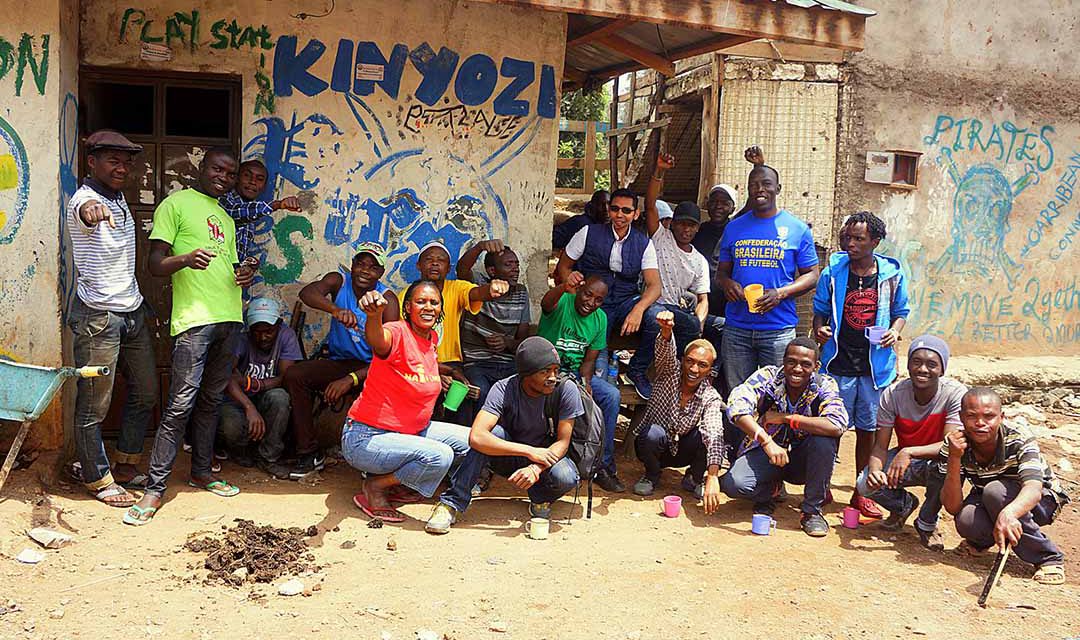
Reginalda Adhiambo’s first-born daughter, Akinyi Onyango, left their Nairobi home in 2014 after she was offered a “lucrative” job in Saudi Arabia. Her mother helped to raise the money for her passport and an air ticket. The family reckoned on Akinyi’s return to Kenya a year later; the money she would have earned would offer the whole family “a new lease on life”.
But in March that year, Adhiambo bid her daughter farewell at Jomo Kenyatta International Airport little knowing that she would never see the young woman again. “That chilly night was the last time I saw my 24-year-old daughter alive,” she told Africa in Fact.
Adhiambo, a mother of eight, who has lived in Kibera, a Nairobi slum, for more than two decades, says she learned of her daughter’s death in the media three months later. Though she learned that the body had deep cuts, indicating torture, she has never been informed of the cause of her daughter’s death. To make matters worse, Adhiambo’s husband passed away the following year, in 2015.
Christine Njeri lives in Githurai, “one of the toughest places to live in Nairobi”, according to Tuko, a Kenyan news outlet aimed mainly at younger readers. She underwent a similar trauma in October 2016 when she learned that her young sister, Mary Magdalene Wamuyu, who was working as a domestic worker in Dubai, had died several months before. The young woman had worked in Dubai for three years.
Mary was forced to seek menial employment abroad despite being a university graduate. She had complained that her employer treated her as a slave, but her older sister had urged her “not to give up”. Now, looking back, she feels stricken by guilt. “I did not know it was that bad,” she said.
These tragic stories point to the struggles of Nairobi youth, who must somehow make ends meet, and often also provide for their families, in an environment where there are no jobs. The situation has been made worse by a deeply ingrained culture of tribalism, nepotism and corruption in the country’s politics. Job seekers must anticipate having to part with a huge bribe if they are actually offered a job.
 Given the limited employment opportunities in Kenya, young people, and especially young women, are leaving the country to work overseas – often in oil-rich Middle East countries. The Ministry of Foreign Affairs estimates that between 85,000 and 100,000 Kenyans are living in Saudi Arabia alone, according to the Kenya National Bureau of Statistics data on employment released in April this year. About 70% of them work as domestic help. In that capacity especially, they are likely to face abuse and exploitation, says the International Labor Organization (ILO) in a 2013 report on domestic workers around the world.
Given the limited employment opportunities in Kenya, young people, and especially young women, are leaving the country to work overseas – often in oil-rich Middle East countries. The Ministry of Foreign Affairs estimates that between 85,000 and 100,000 Kenyans are living in Saudi Arabia alone, according to the Kenya National Bureau of Statistics data on employment released in April this year. About 70% of them work as domestic help. In that capacity especially, they are likely to face abuse and exploitation, says the International Labor Organization (ILO) in a 2013 report on domestic workers around the world.
Despite their significance to the local economy, as well as those of other host countries, Kenya’s domestic workers are employed in a sector with none or weak laws, a general lack of interest in the sector, and little coordination between government agencies and partners such as the ILO, says Jacob Omollo, a senior lecturer at the Department of Applied Economics at Kenyatta University in Nairobi. The result: frequent mistreatment, he told Africa in Fact.
Omollo argues that to address this situation, Kenya should ratify the ILO’s Convention 189, which came into force on September 5, 2013, and sets labour standards for domestic workers. This, he says, would enhance protection for Kenya’s domestic workers, and would also represent the first steps to addressing a history of domestic workers’ exclusion from labour and social protection.
While some of Nairobi’s young people continue to seek employment abroad, others try to battle it out at home, often unable to find employment despite having invested in expensive university studies. Maryanne Nyaboke, 26, a resident of Mathare slums in Nairobi, says she worked hard at the University of Nairobi’s School of Medicine for six years with the aim of achieving a well-paying job.
“When I opted to pursue medicine at the university, I was sure of getting posted to a health facility where I would use the knowledge I have gained in treating the sick in our society,” she told Africa in Fact. Yet, two years after graduating she is still unemployed. “It is ironic that we see so many hospitals and dispensaries in Kenya complaining of a shortage of doctors, yet we are idling.”
Nyaboke’s plight is not unqiue. There are more than 1,200 unemployed doctors in Kenya, according to Kenya’s Medical Practitioners, Pharmacists and Dentists Union (KPMDU) Secretary General Ouma Olago. And yet, claiming the country has a shortage of medical practitioners, the government has recently employed at least 100 doctors from Cuba, he says.
While the union appreciates the fact that the government is under pressure to fulfil its universal healthcare promise to Kenyans, he argues that the country should ensure that it employs all the doctors who graduate from its education system. KPMDU estimates that there are currently some 2,400 foreign doctors working in Kenya.
While the Kenyan government does not provide a breakdown of youth unemployment, statistics from the Kenyan government’s Economic Survey 2018 released in April shows that some 16.9 million people were employed in 2017. Meanwhile, some 110,000 new jobs were created in that year, as compared to 84,800 in 2016. The new jobs included the extra personnel engaged by the public sector to serve in the Independent Electoral and Boundaries Commission, as well as in the health, education and security services, Treasury Cabinet Secretary Henry Rotich told Africa in Fact.

Meanwhile, the informal sector created 787,800 new jobs in 2017, or 83.4% of total employment, and the total number of self-employed workers increased from 132,500 in 2016 to 139,400 in 2017, said Rotich. The rise in self-employment was due mainly to government programmes such as the Uwezo Fund, which assists business start-ups by women and youth by providing access to low-cost credit, he said.
Young people and women were fast “losing appetite for formal jobs”, Rotich added, although he declined to provide exact figures for the number of young people in formal employment. Business-friendly policies coupled with technological innovations had generated conditions that encouraged young people to create their own jobs. “Having appreciated this new trend, the government has come up with different platforms that make it easy for these young people to access capital,” he said.
These sentiments are echoed by Deputy President William Ruto. In May this year, during the launch of the first Microsoft Software Testing Centre in Nairobi, he said young people needed to be “ambitious and innovative”, rather than waiting for jobs to be created for them. The government was committed to making Kenya an exporter and producer, rather than a mere consumer of technological innovation.
“The Government wants a vibrant technology sector in this country, a Silicon Savannah, and we believe if we can build a proper community of engineers, developers, coders and designers, we can deliver the innovations that will define the prosperity of this country in the future,” he told the listening dignitaries and business people.
But Central Organisation of Trade Unions (COTU) Secretary General Francis Atwoli says youth employment in Kenya is in crisis. He said young people were tired of the “usual lies” that the country’s economy was not growing, and that this limited opportunities to create jobs for young people. The peaceful 2017 general election had ushered in an era of macroeconomic stability, and this had been strengthened by recent conciliatory gestures between President Uhuru Kenyatta and the leader of the opposition, Raila Odinga.
In such a context, Atwoli argued, employers should be looking to achieve higher outputs, and that this aim should translate into more jobs for young people.
Moreover, a tendency had been observed where international firms were hiring non-Kenyans to carry out even the most junior duties, which was helping to lock talented Kenyan youths out of work. In April this year, the Internal Security Cabinet Secretary Fred Matiang’i called for a “thorough” audit of foreigners working in Kenya. “There is no need for some firms to hire outsiders when Kenyans can carry out the same work at a relatively lower wage without compromising output,” he told a press briefing in May.
Nevertheless, Michael Nalianya, a fifth-year engineering student at Moi University, located in the west of Kenya, sees some prospects for the future. When he graduates he is looking forward to working for the Friends of Lake Turkana (FoLT), an NGO that promotes environmental responsibility, with a main focus on conservation efforts around Lake Turkana in northern Kenya.
In addition, the organisation aims to help young people in need by offering training and jobs, when available, Ikal Angelei, a co-founder of FoLT told Africa in Fact. “The greatest contributor to environmental degradation is poverty, which is a result of a lack of income,” she said. Other organisations in the NGO space share this approach. One Acre Fund, an American NGO that supports smallholder farmers, says that it encourages young people to consider a future in agriculture, which is proving that it can yield high returns in Kenya, according to its website.
Caleb Karuga, a former television journalist, now CEO of Wendy Farms, a commercial farming operation that focuses on chickens and vegetables, says he himself is an example of this. “Farming is cool. I can attest to this, having left a good job in media to go into farming,” he told Africa in Fact. He urged young people who wanted to make money to follow in his footsteps.
CHARITY CHELIMO is a current affairs analyst based in Nakuru, Kenya. She holds a masters degree in finance for the University of Nairobi and has more than six years’ writing experience.













